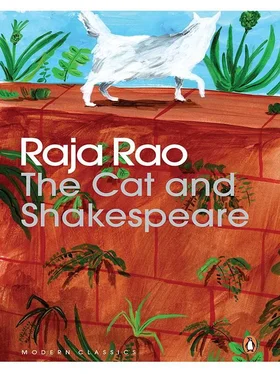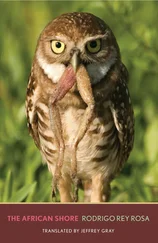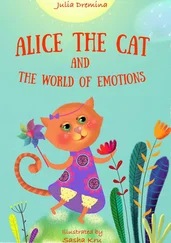Rao Raja - The Cat and Shakespeare
Здесь есть возможность читать онлайн «Rao Raja - The Cat and Shakespeare» весь текст электронной книги совершенно бесплатно (целиком полную версию без сокращений). В некоторых случаях можно слушать аудио, скачать через торрент в формате fb2 и присутствует краткое содержание. Год выпуска: 2014, Издательство: Penguin, Жанр: Современная проза, на английском языке. Описание произведения, (предисловие) а так же отзывы посетителей доступны на портале библиотеки ЛибКат.
- Название:The Cat and Shakespeare
- Автор:
- Издательство:Penguin
- Жанр:
- Год:2014
- ISBN:нет данных
- Рейтинг книги:4 / 5. Голосов: 1
-
Избранное:Добавить в избранное
- Отзывы:
-
Ваша оценка:
- 80
- 1
- 2
- 3
- 4
- 5
The Cat and Shakespeare: краткое содержание, описание и аннотация
Предлагаем к чтению аннотацию, описание, краткое содержание или предисловие (зависит от того, что написал сам автор книги «The Cat and Shakespeare»). Если вы не нашли необходимую информацию о книге — напишите в комментариях, мы постараемся отыскать её.
The Cat and Shakespeare — читать онлайн бесплатно полную книгу (весь текст) целиком
Ниже представлен текст книги, разбитый по страницам. Система сохранения места последней прочитанной страницы, позволяет с удобством читать онлайн бесплатно книгу «The Cat and Shakespeare», без необходимости каждый раз заново искать на чём Вы остановились. Поставьте закладку, и сможете в любой момент перейти на страницу, на которой закончили чтение.
Интервал:
Закладка:
‘Its characteristics are — its characteristics are,’ mumbled John, and as somebody said, he had cleared his bladder audibly. It poured an acrid smell into the room. Bhoothalinga Iyer had a bad cold, and one could hear him snuff in snuff. There was such silence in the office (but for the burring sound of Govindan Nair, who always burred anyway) that Bhoothalinga Iyer was sure everybody was at work. There was suddenly silence even in the ration shop. And this was the sort of silence which sometimes rises like a temple pillar from earth to heaven; all creation seems still, as if the universe pondered: What next?
‘First of all, it’s of the same family as the lion,’ said Rama Krishna, a young clerk. He had joined them only three months ago, fresh from college.
‘Then?’ asked Govindan Nair.
‘Then,’ said Abraham, getting very anxious, ‘it goes in and out of one’s house as not even a man can.’
‘What very intelligent colleagues I have,’ remarked Govindan Nair, smiling. ‘Then?’
‘A cat is the purest animal in the world.’
‘Why so? Hey, there, Syed, what does your Muslim theology say about it?’
‘In Muslim theology only the chameleon is evil. It betrayed Muhammed. And the hog. But the cat, it is sacred.’
‘No, man, I know your theology better. The cat is not sacred in Islam. It is sacred in Egypt. It was called Bastet.’
‘And it wore a crown?’ said John, a little reassured that all this was a joke.
Govindan Nair quickly made a paper crown; he cut the three sides of a triangle and gave it a point, and placed it on the head of the cat and said: ‘Hey, Bastet, you are sacred, don’t you understand?
‘And, Syed, what is it your people do when what is sacred is treated as what is sacred?’
‘We kneel and touch the ground and ask for Allah’s blessings.’
‘Now, Mr John, you understand. Here is Bastet. You have brought a very god to our poor ration office. You be the priest.’
‘Oh, no,’ said John. He knew Govindan Nair had something up his sleeve.
‘Kneel!’ shouted Govindan Nair. ‘Kneel, man!’ And he brandished his knife, holding the cat firmly with his left hand. ‘Or say: No sir, I am a low-born, I am a coward. Kneel!’ he shouted. Bhoothalinga Iyer’s chair creaked. ‘You don’t insult a cat like this, stuffing a cat into a rat cage.’
John knelt devoutly.
‘There, once again,’ shouted Govindan Nair.
John knelt again, crossing himself. Syed had his hands brought together. All the office was one noumenal silence.
‘Kiss it,’ shouted Govindan Nair again.
John kissed the cat. Bhoothalinga Iyer came and stood behind the crowd. He thought some file was being tampered with.
‘Govindan Nair!’ he shouted.
‘Yes, sir.’ And Govindan Nair went towards his boss. The cat jumped down the table and everybody gave way to the cat. By now she’s lost her crown. Rubbing against his legs it cried meow, meow and Govindan Nair lifter her up and placed her on his shoulder with his right hand. His knife was still in the left.
‘What is this?’ asked Bhoothalinga Iyer.
‘We’ve been discussing the Latin formation for Persian cat. Do you know it, sir?’
‘In Sanskrit it is called marjaram,’ he said as if he were saying it with only the tip of his tongue. ‘And for Persian cat there’s no word in ancient Sanskrit.’
‘In Malayalam it is called poochi-poochi,’ said Govindan Nair, as he went back with the boss to the inner office.
The boss sat down in his chair.
The cat jumped on to Bhoothalinga Iyer’s table. It saw another tassel of a file and started playing with it. Bhoothalinga Iyer, seeing all the eyes of the office (for everybody, as it were, came to see what was happening), wanted to shout: Get out! Get away! But his tongue would not say it. How can you say with what is not what is? How can you shape words that cannot come from yourself? What do you do if you find yourself a prisoner? You want to escape. Govindan Nair laid the knife on the table and said to Bhoothalinga Iyer: ‘Sir, tell me a story.’
‘What story?’
‘Any story.’
‘I know no story.’
‘I’ll tell you a story,’ said Govindan Nair, and lifted the cat and placed her on his shoulder.
‘Once upon a time,’ he began, and before he could go on, the cat jumped on to Bhoothalinga Iyer’s head. Bhoothalinga Iyer opened his eyes wide and said, ‘Shiva, Shiva,’ and he was dead. He actually sat in his chair as if he could not be moved.
Govindan Nair rushed back home with the beautiful Persian cat in the cage and let it loose in the house. Then it was he went to Bhoothalinga Iyer’s funeral. Bhoothalinga Iyer’s wife, Lakshamma, was moved, deeply moved, by all the consoling words Govindan Nair spoke to her. He spoke of death and birth and such things. He too was weeping. His boss had died. Bhoothalinga Iyer had asthma. And asthmatics have weak hearts. And the snuff did not help, did it — said the Brahmins at the door of the temple.
For some strange reason, everybody came to console Govindan Nair at his office as if he had lost something. Kunni Krishna Menon from the next house came and spoke as though Govindan Nair needed condolence. Perhaps he would be promoted to his boss’s place — there was such a rumour. Then he could not run down and play with the children, remarked Abraham. An officer could not do it. ‘Then you be boss, Abraham,’ said Govindan Nair, hugging him.
With two deaths within forty days Govindan Nair moved about in a bemazed state. He had loved Bhoothalinga Iyer, and true, it was the cat that had jumped on the boss’s head. But who had brought in the cat? John, of course. And Bhoothalinga Iyer had no business to be asthmatic. And so the boss died. Usha talked across the wall to Shridhar, and he died. True, you call it pneumonia (Dr N.O. Pillai said so), but Shridhar died. Thus Govindan Nair made Abraham the chief, and had him so nominated. He preferred, did Govindan Nair, to be clerk. People said this and that, and they said now Govindan Nair can go on building houses. A boss cannot do it. Govindan Nair said, ‘To be a boss one has to be asthmatic or diabetic,’ and everybody laughed. For Abraham could not live without insulin.
Abraham was withal an able officer. He bought himself a new (second-hand) bicycle, a green B.S.A., and when he came to office he looked like a padre going to his flock.
Abraham’s strength was that he was a good man. If good men did not run ration offices who should? This was the argument of Govindan Nair. We should not all become British agents. So Bhoothalinga Iyer’s widow was given rice as if Bhoothalinga Iyer were still alive. Where after all could the poor man have gone, with the scarf on his head (tied tight like a turban), and his perpetual cold because of snuff, and his love for service regulations, Section No. 345 of the Travancore Civil Service rules, etc.? Yet he did not die a gazetted officer. He might have, had he lived longer.
Ration cards for orphans and such others were not looked into too carefully. You gave a card eventually to those who needed it. The rascals were there for the rest. Someone will always build a temple spire to expiate his sins. Man has a heart white as a rice pod but he makes it dark as a lentil pod, for he thinks the world is a scale, and the master weigher is not Abraham. Lord save us from our sins. Lord, may rice be rice, and lentil be lentil. That is the secret of the world. You want to make the rice lentil. Botanists will tell you, rice is Oryza sativa and lentil Lens esculenta. How can the sativa become esculenta ? How can two not seek the not-two? Find this secret and you need no gold to seek happiness.
Govindan Nair brought back the cat and gave it to me. Somehow he thought I would look after it well. ‘I look after a cat?’ I said. ‘Ask Saroja and she will tell you,’ Govindan Nair said. ‘Don’t ask Saroja, ask Shantha,’ and Shantha said that I love cats. Do I? If anyone tells you, you are a rascal, can you prove that you are not? How do you know? What do you really know? Can a rascal see his rascalry? How could he, poor man? So if Shantha says I love cats she must be right. After all, she is seven months pregnant and she must know it better than I. They say pregnant women are holy. They have second sight. Does Usha think I am what I am? She thinks I am her father. How do I know I am her father? Because she tells me so. Because Saroja said: ‘This is your child,’ when I went back on leave two months after the child’s birth. ‘This is your child,’ she said. She must know. Who knows, anyway? Knowledge alone knows. So how shall I ever know if I love cats? I must know cats and I must know that I know that I love cats. When cats are there, where am I? When I am there, what becomes of the cats? ‘It is not easy, Shantha, to say I love cats.’ ‘But,’ she protests, ‘Govindan Nair says you love the cat. That is why he had the wall cut just where the stones stood for Usha to speak to Shridhar. When you can walk to the next garden, you can say “I love the cat.” Can you not say I love I?’ ‘No, Shantha, I love you.’ Shantha says: ‘Good it is that I am a Hindu woman and you are my lord. If I were not that, but one of those big-bosomed women of the European films, smoking and kissing in public, I would not say yes to you all the time, I would say no.’ ‘Then what is it you want to say, you my Hindu wife?’ ‘I say, to say I love you is to say I love myself.’ ‘Who said so, Shantha?’ ‘Sage Yagnayavalkya said so.’ I now understand. Yes, I love Shantha because she has my child in her. That is the secret. She has myself in her.
Читать дальшеИнтервал:
Закладка:
Похожие книги на «The Cat and Shakespeare»
Представляем Вашему вниманию похожие книги на «The Cat and Shakespeare» списком для выбора. Мы отобрали схожую по названию и смыслу литературу в надежде предоставить читателям больше вариантов отыскать новые, интересные, ещё непрочитанные произведения.
Обсуждение, отзывы о книге «The Cat and Shakespeare» и просто собственные мнения читателей. Оставьте ваши комментарии, напишите, что Вы думаете о произведении, его смысле или главных героях. Укажите что конкретно понравилось, а что нет, и почему Вы так считаете.












